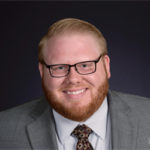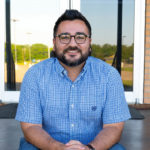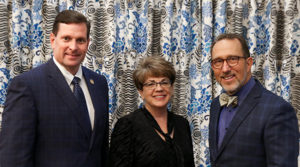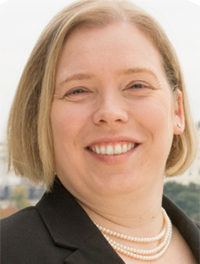Task force proposed to involve Gen Z and Millennials
A motion at next week’s Baptist General Convention of Texas annual meeting will call on the convention to form and fund a task force to involve Millennials and Generation Z in Texas Baptist life in greater ways.

Chris McLain, pastor of First Baptist Church in Bandera, will submit the motion at Texas Baptists’ annual meeting in Galveston, Nov. 14-16. The motion will call for the BGCT president to name a task force that will recommend ways to involve individuals age 40 and younger in BGCT life and ministry.
The proposed motion states: “I move the creation of a task force for the purpose of studying how to involve Millennial and Gen Z Baptists in the life and work of the BGCT and cooperating churches and then present a report with recommendations at the May 2022 BGCT Executive Board meeting. The president of the BGCT shall appoint the task force, and the task force shall have a budget of $10,000 to cover reimbursable expenses related to this study.”
Demographers generally define Millennials as individuals born between 1981 and 1996. They typically describe individuals born between 1997 and 2015 as belonging to Generation Z.
Not what was originally planned
Originally, leaders in The Pastor’s Common network had a different motion in mind. They wanted Texas Baptists to adopt a “25 by ’25” goal—aiming for Millennials and Generation Z to represent at least 25 percent of full-time BGCT staff and 25 percent of the convention’s Executive Board and committee members by 2025.
McLain led the team on generational change that also included Abraham Quiñones, associate pastor of The Promise Church in Dallas; Scotty Swingler, student pastor at Sugar Land Baptist Church; and David Miranda, director of ministers development with Texas Baptists.
The group’s stated desire was to “have younger leaders in the pipeline and provide on-ramps for them to get involved,” McLain said. They envisioned increasing numbers of Millennials and Generation Z ministers beginning to serve in “second-chair” roles alongside experienced staff who could mentor them.
“We don’t want to lose all that institutional knowledge” when the current senior staff retires, he emphasized.
Making adjustments due to concerns
However, in recent days, the group learned the specific employment goals could open up the BGCT to age-discrimination lawsuits.
“Upon learning that, we immediately began working on a way to change the motion that would eliminate that liability,” McLain said.
They also learned any substantive change to the composition of the Executive Board would require an amendment to the convention’s bylaws—a process that involves approval by messengers to the annual meeting two consecutive years. Other requirements for representation on the Executive Board—30 percent ethnic minorities, 40 percent laypeople and 40 percent pastors—are written into the bylaws.
McLain called that kind of change “beyond the scope of this motion.”
“That change may come further down the road, perhaps included among the recommendations that the task force will develop, but we are going to wait on that and ensure proper procedure is followed for that type of change,” he explained.
Changed ‘out of our love for the BGCT’
While the motion McLain will introduce in Galveston next week lacks the specific “25 by ’25” goals, he believes the task force has potential to bring about significant change. He also emphasized the group that proposed the original motion freely chose to change it.
“We want to be abundantly clear that we are not making this change because we were pressured into it by anyone, including BGCT leadership. We are changing it out of our love for the BGCT and desire to see it thrive and grow in the work of the kingdom,” McLain said.
“The original version of our motion, were it presented and adopted, had the potential to do harm to Texas Baptists. This motion, on the other hand, creates an avenue for appropriate and speedy action to address the needs of Texas Baptist Millennials, Gen Z and churches without exposing the convention we hold dear to unnecessary risk.
“It very well may be that this resolution will be more effective at helping Texas Baptists reach Millennials and Gen Z than the previous one. We pray that it is, and we share it in that spirit.”
Desire to see Texas Baptists ‘thrive’
McLain also emphasized the action does not represent any sort of hostile “takeover” of Texas Baptists.
“These are not outsiders. We are people who are deeply invested in Texas Baptist life—pastors who love the institution and who want to see it thrive and move into what’s ahead,” he said.

In response to Editor Eric Black’s editorial advocating for increased numbers of young adults in BGCT leadership, Jordan Villanueva, second vice-president of the BGCT and a leader among Texas Baptist young adults, posted on Facebook: “This isn’t an ‘if we don’t get our way we are going home’ situation. We are committed to what the Lord has done throughout TXB history and just want to do our part to make sure the work continues into the future.”
Leaders of The Pastor’s Common network also drafted a closely related resolution on generational change—along with others on “unity in essentials” and “affirmation of women”—they already submitted to the BGCT resolutions committee.
An explanation of the motion and resolutions will be part of the program during the Devoted at the Pier rally for Millennial and Generation Z ministers from 4 p.m. to 8 p.m. on Nov. 14 in Galveston, prior to Texas Baptists’ annual meeting, McLain said.
David Lowrie, pastor of First Baptist Church in Decatur and a former BGCT president, applauded the desire of young Texas Baptists “to have a voice in the future.”
“We would be foolish to not embrace this desire. I pray their number will multiply,” Lowrie wrote in an email. “Years ago, I was one of those young leaders. I remember watching but having little voice or influence. I had to fight my way into the conversation.
“Those days need to end. I realize I have the unique opportunity to be heard because of my legacy. I pray these young leaders will be affirmed and heard, plus I pray they will also learn from those of us who have gone before them as well. We need each other so much, especially now.”





